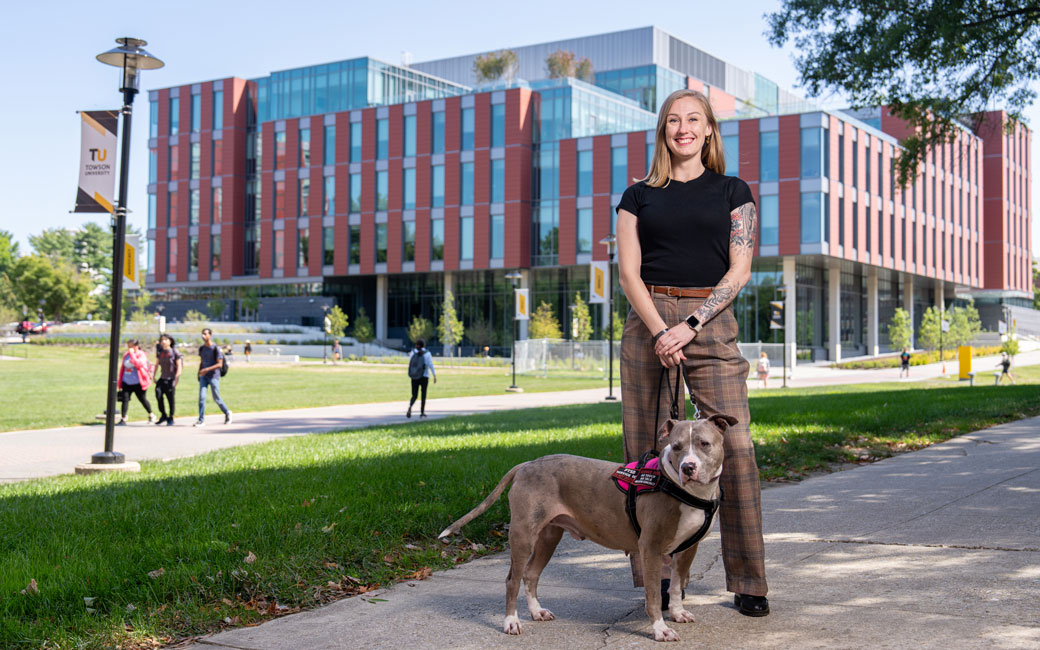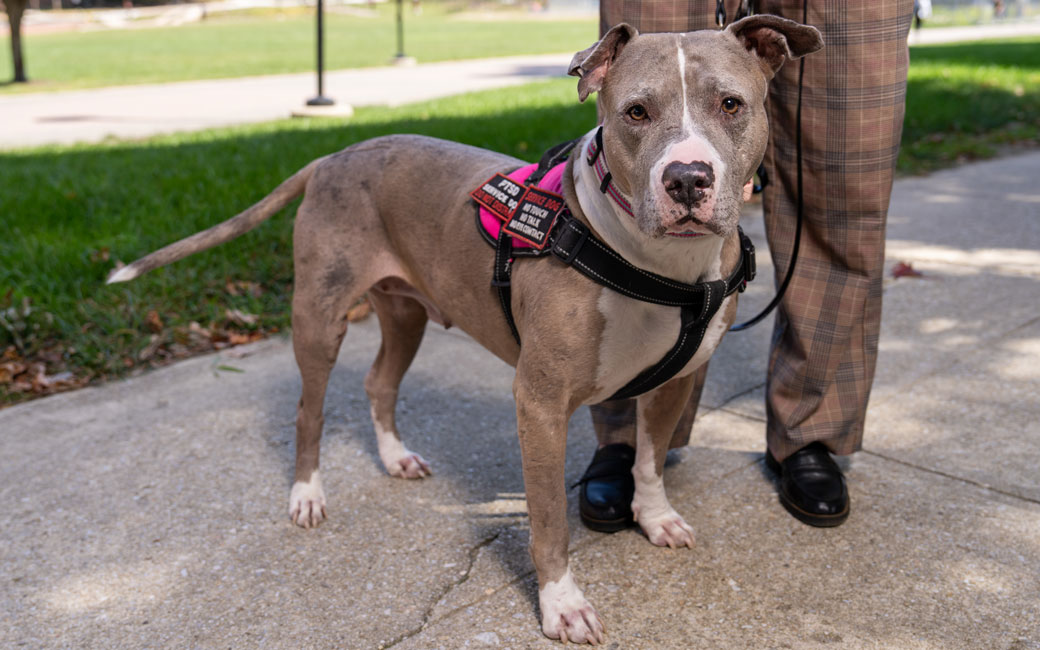Calling the Military and Veterans Center home
Marine veteran Tiffany Marsh, her service dog Roxy support fellow veterans, military family members at TU
By GRACE HOGGARTH '22 on September 18, 2024

It’s unlikely to see Tiffany Marsh without her service dog and partner in crime, Roxy, while strolling campus. After over a year and a half of navigating life together, the pair has made their mark on TU by empowering fellow veterans and their family members.
The reason this dynamic duo ended up at TU is because Marsh always had a passion for uplifting the deaf community. She even learned sign language in elementary school to communicate with her best friend.
After receiving her first bachelor’s degree in deaf studies in her home state of California, Marsh moved to Florida to pursue her second bachelor’s in language, speech and hearing sciences— all of which led her to TU’s audiology (Au.D.) program in the College of Health Professions.
“I love TU. It’s crazy that a year and a half ago I had no clue what TU was. Now here I am, thriving,” Marsh says.
Coming off active duty and reintegrating into civilian life after a deployment in South Korea, particularly in a new state, was a challenge for Marsh. Thankfully, with the help of TU’s Military & Veterans Center (MVC), Marsh felt supported before stepping foot on campus.
Dario DiBattista, director of the MVC, and Toby Frevert, coordinator of military-affiliated supports and services & lead school certifying official listened intently to Marsh’s concerns and helped get her service animal needs met—support she hadn’t experienced at a previous institution.
When Marsh started at TU, she admittedly didn’t anticipate being very involved in the MVC. But as soon as she met the community in person, she couldn’t not be.
“The MVC has been a critical part of my life here in Towson,” Marsh says. “Everyone was so welcoming, kind and supportive. You come into the office, and then you look down and realize it's been six hours. It's like a home away from home.”
Providing peer support
A domestic violence survivor herself, Marsh is passionate about helping others who are battling post-traumatic stress disorder, anxiety and other mental health issues.
Soon after getting involved in the MVC, she became a peer support specialist. Marsh makes students aware of their military benefits, helps them take advantage of the benefits and provides them a safe space to be mindful of their mental health.
She knows from personal experience sometimes people won’t take care of themselves until someone else reminds them to do it.
Many veterans or military family members are unaware of the financial and mental health benefits they have access to. Marsh and fellow peer support specialists—many of whom are former active duty, reserves or have 100% disability—aim to change that.
"The best part of this role is that you’re actually helping people,” she says. “We have a breadth of experience, and we can provide resources and assistance to just about anyone who comes in. We’re here for you, and we mean it.”
Marsh is the first veteran student in her doctoral program to have a service dog in class. Roxy regularly attends Marsh’s clinical courses and is beloved by everyone she meets.
She doesn’t just support Marsh though. Dubbed the MVC’s unofficial mascot, Roxy has become a pillar in the center and brightens everyone’s day. While Roxy is task trained, she provides significant emotional support as well.
“We like to joke that Roxy’s working on her ‘dog-torate,’” says Marsh.

Following Roxy’s lead, Marsh has wanted to further build community among veterans and military members. So she took over as the president of the Tiger Veterans Group, an organization run by veterans and military members to assist students with educational, medical and/or career needs and social support on campus.
Too often, active service members and veterans are taught to suppress or “tough out” traumatic experiences. The greater conversation surrounding mental health in the military is still somewhat taboo.
Through community-building organizations like the Tiger Veterans Group, Marsh and the MVC are inviting change to this narrative, starting at TU.
“Tiffany is a 'cheat code' for us as far as I'm concerned—given her maturity, experience and the leadership she provides as a Marine Corps veteran,” DiBattista says. “As an ambassador of our community, she absolutely shines while uplifting us all, and I'm so appreciative she wants to be a hype person for us."